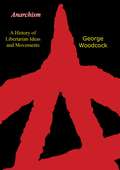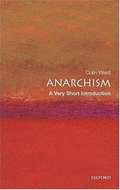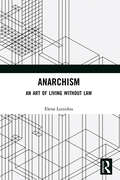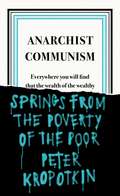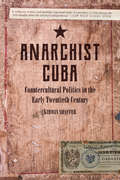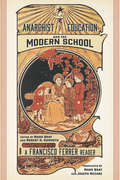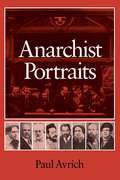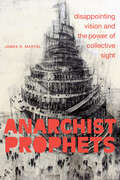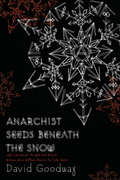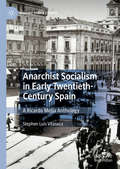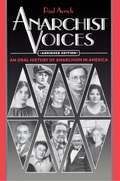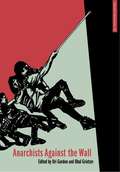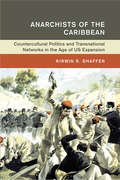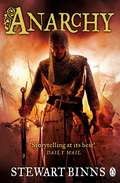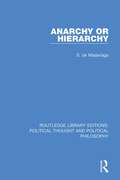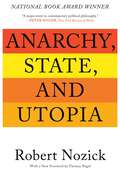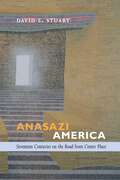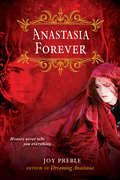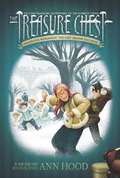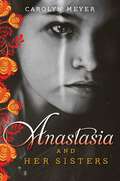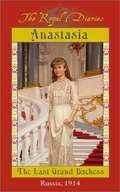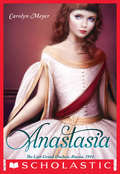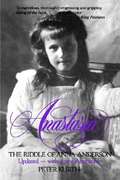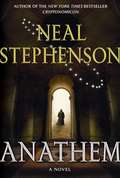- Table View
- List View
Anarchism: A History of Libertarian Ideas and Movements (Pelican Ser.)
by George Woodcock“‘Whoever denies authority and fights against it is an anarchist,’ said Sebastien Faure. The definition is tempting in its simplicity, but simplicity is the first thing to guard against in writing a history of anarchism. Few doctrines or movements have been so confusedly understood in the public mind, and few have presented in their own variety of approach and action so much excuse for confusion.” These are the opening sentences of this book, which brilliantly effaces confusion by providing a critical history of anarchist thought and practice.Mr. Woodcock traces the development of anarchism from its earliest appearances, and the rise and fall of anarchism as a movement aiming at practical social changes during the nineteenth and twentieth centuries. He discusses the ideas of the principal anarchist thinkers—Godwin, Proudhon, Bakunin, Kropotkin, Tolstoy, among others—and explains the various forms—anarchist individualism, anarchist communism, anarcho-syndicalism—that anarchist proposals for change have taken. The development of anarchist organizations, the various forms (peaceful and violent) of anarchist political action in Europe and America, the reasons for the appeal of anarchism at certain periods and to certain people—all these are given full treatment in Mr. Woodcock’s comprehensive work, which closes with a discussion of the causes of anarchism’s failure as a movement and with a consideration of whether there are any elements in anarchist thought that—despite the failure of anarchism as a political panacea—may still be worth preserving in the modern world.“The essential introduction to the classical anarchist thinkers.”—Mark Leier, Director, Centre for Labour Studies, Simon Fraser University
Anarchism: A Very Short Introduction
by Colin WardWhat do anarchists want? It seems easier to classify them by what they don't want, namely, the organizations of the State, and to identify them with rioting and protest rather than with any coherent ideology. But with demonstrations like those against the World Bank and the International Monetary Fund being blamed on anarchists, it is clear that an explanation of what they do stand for is long overdue. Colin Ward provides answers to these questions by considering anarchism from a variety of perspectives: theoretical, historical, and international, and by exploring key anarchist thinkers, from Kropotkin to Chomsky. He looks critically at anarchism by evaluating key ideas within it, such as its blanket opposition to incarceration, and policy of "no compromise" with the apparatus of political decision-making. Can anarchy ever function effectively as a political force? Is it more "organized" and "reasonable" than is currently perceived? Whatever the politics of the reader, Ward's argument ensures that anarchism will be much better understood after reading this book.
Anarchism: An Art of Living Without Law
by Elena LoizidouThe term anarchism derives from the Greek word ἀναρχία meaning ‘without ruler or leader, and without law’. Although the roots of the word can be traced back to Ancient Greece, anarchism as a political ideology is relatively new. Anarchism developed as a political ideology at the end of the eighteenth century at the time of the emergence of the modern State. And, as is well known, anarchism developed both a politics and a way of life that did not include the State as its compass, support and structure. In contrast to the extensive contemporary literature about anarchist politics and ideas, this book focuses on the practices and attitudes that constitute what the author refers to as an anarchist ‘art of life’. The book draws on archival material that records the life and actions of the anarchist Emma Goldman and her associates, legal documents and writings by classical (Pierre Joseph Proudhon, Peter Krotopkin) and contemporary anarchists (David Graeber, Saul Newman, Ciarra Bottici), as well as contemporary groups such as the Clandestine Insurgent Rebel Clown Army and Occupy Wall Street. By studying the idiosyncrasies of this art of life, it argues, we are better able to appreciate how anarchism is not some future utopian oriented project, waiting to come into existence after a revolution, but rather exists in parallel to the life and politics offered by the State. Anarchism: An Art of Living Without Law will be of interest to graduate students and academics working on critical legal theory, political theory, sociology and cultural studies.
Anarchist Communism: Three Essays (Penguin Great Ideas)
by Peter Kropotkin'Everywhere you will find that the wealth of the wealthy springs from the poverty of the poor'Fuelled by anger at injustice and optimism about humankind's ability to make a better, truly communal society, the anarchist writings of Peter Kropotkin have influenced radicals the world over, from nineteenth-century workers to today's activists.One of twenty new books in the bestselling Penguin Great Ideas series. This new selection showcases a diverse list of thinkers who have helped shape our world today, from anarchists to stoics, feminists to prophets, satirists to Zen Buddhists.
Anarchist Cuba: Countercultural Politics in the Early Twentieth Century
by Kirwin ShafferIn this volume, Kirwin Shaffer shows that anarchists played a significant—until now little-known—role among Cuban leftists in shaping issues of health, education, immigration, the environment, and working-class internationalism. They also criticized the state of racial politics, cultural practices, and the conditions of children and women on the island. In the chaotic new country, members of the anarchist movement interpreted the War for Independence and the revolutionary ideas of patriot José Martí from a Far-Left perspective, embarking on a nationwide debate with the larger Cuban establishment about what it meant to be Cuban. To counter the dominant culture, the anarchists created their own initiatives to help people—schools, health institutes, vegetarian restaurants, theater and fiction writing groups, and occasional calls for nudism—and as a result they challenged both the existing elite and the occcupying U.S. military forces. While many of their ideals flowed from Europe, their programs, criticisms, and literature reflected the specifics of Cuban reality and appealed to Cuba's popular classes. Using theories of working-class internationalism, countercultures, popular culture, and social movements, Shaffer analyzes archival records, pamphlets, newspapers, and novels, showing how the anarchist movement in republican Cuba helped shape the country's early leftist revolutionary agenda until the rise of the Gerardo Machado dictatorship in the 1920s. This important book places anarchism in its rightful historical place as a vital current within Cuban radical political culture.
Anarchist Education and the Modern School: A Francisco Ferrer Reader
by Mark Bray Francisco Ferrer Robert H. HaworthFrancisco Ferrer navigated a tempestuous world of anarchist assassins, radical republican conspirators, anticlerical rioters, and freethinking educators to establish the legendary Escuela Moderna and the Modern School movement. Compiling many pieces translated into English for the first time, this collection presents Ferrer’s work in conversation with that of his comrades, collaborators, and critics to show the complex truth about the movement’s founder and martyr.
Anarchist Portraits
by Paul AvrichFrom the celebrated Russian intellectuals Michael Bakunin and Peter Kropotkin to the little-known Australian bootmaker and radical speaker J. W. Fleming, this book probes the lives and personalities of representative anarchists.
Anarchist Prophets: Disappointing Vision and the Power of Collective Sight
by James R. MartelIn Anarchist Prophets James R. Martel juxtaposes anarchism with what he calls archism in order to theorize the potential for a radical democratic politics. He shows how archism—a centralized and hierarchical political form that is a secularization of ancient Greek and Hebrew prophetic traditions—dominates contemporary politics through a prophet’s promises of peace and prosperity or the threat of violence. Archism is met by anarchism, in which a community shares a collective form of judgment and vision. Martel focuses on the figure of the anarchist prophet, who leads efforts to regain the authority for the community that archism has stolen. The goal of anarchist prophets is to render themselves obsolete and to cede power back to the collective so as to not become archist themselves. Martel locates anarchist prophets in a range of philosophical, literary, and historical examples, from Hobbes and Nietzsche to Mary Shelley and Octavia Butler to Kurdish resistance in Syria and the Spanish Revolution. In so doing, Martel highlights how anarchist forms of collective vision and action can provide the means to overthrow archist authority.
Anarchist Seeds Beneath the Snow: Left-Libertarian Thought and British Writers from William Morris to Colin Ward (Liverpool University Press Ser.)
by David GoodwayFrom William Morris to Oscar Wilde and George Orwell, left-libertarian thought has long been an important but neglected part of British cultural and political history. In this detailed study, David Goodway seeks to recover and revitalize that indigenous anarchist tradition. This book succeeds as both a cultural history of left-libertarian thought in Britain and an application of that history to current politics. The author argues that a recovered anarchist tradition could—and should—be a touchstone for contemporary political radicals. Moving seamlessly from Aldous Huxley and Colin Ward to the war in Iraq, this challenging volume will energize leftist movements throughout the world.
Anarchist Socialism in Early Twentieth-Century Spain: A Ricardo Mella Anthology (Hispanic Urban Studies)
by Stephen Luis VilasecaAnarchist Socialism in Early 20th Century Spain is the first English translation of and critical introduction to Ideario, a collection of newspaper and journal articles written by Spanish anarchist Ricardo Mella. Given that Mella is virtually unknown to the English-speaking world, this book provides readers access to his extensive body of work about Spain, human nature, and a world increasingly dominated by capitalism. Suitable for both the general public interested in learning more about anarchist ideas and for scholars studying twentieth-century Spain, the three introductory essays help to introduce Mella, ground his work in the context of Spanish anarchism, and draw connections between Mella and the urban in late nineteenth- and early twentieth-century Spain. Stephen Luis Vilaseca’s translation is accessible and engaging.
Anarchist Voices: An Oral History of Anarchism in America - Abridged paperback Edition
by Paul AvrichThrough his many books on the history of anarchism, Paul Avrich has done much to dispel the public's conception of the anarchists as mere terrorists. In Anarchist Voices, Avrich lets American anarchists speak for themselves. This abridged edition contains fifty-three interviews conducted by Avrich over a period of thirty years, interviews that portray the human dimensions of a movement much maligned by the authorities and contemporary journalists. Most of the interviewees (anarchists as well as their friends and relatives) were active during the heyday of the movement, between the 1880s and the 1930s. They represent all schools of anarchism and include both famous figures and minor ones, previously overlooked by most historians. Their stories provide a wealth of personal detail about such anarchist luminaries as Emma Goldman and Sacco and Vanzetti.
Anarchists Against the Wall
by Uri Gordon Ohal GrietzerPart of a small but growing phenomenon in Israel since 2003, Anarchists Against the Wall have been boldly challenging the Segregation Barrier and generalised violence against occupied Palestine. The reflections herein offer a window into some of the most dynamic direct action activism today. Includes contributions from several well-respected journalists and political commentators, including: Bill Templer, Adar Grayevsky, Yanai Israeli, Kobi Snitz, Anat Guthmann, Anat Matar, Neve Gordon, Yossi Bartal, Sarah Assouline, Basel Mansour and the editors themselves.
Anarchists of the Caribbean: Countercultural Politics and Transnational Networks in the Age of US Expansion (Global and International History)
by Kirwin R. ShafferAnarchists who supported the Cuban War for Independence in the 1890s launched a transnational network linking radical leftists from their revolutionary hub in Havana, Cuba to South Florida, Puerto Rico, Panama, the Panama Canal Zone, and beyond. Over three decades, anarchists migrated around the Caribbean and back and forth to the US, printed fiction and poetry promoting their projects, transferred money and information across political borders for a variety of causes, and attacked (verbally and physically) the expansion of US imperialism in the “American Mediterranean.” In response, US security officials forged their own transnational anti-anarchist campaigns with officials across the Caribbean. In this sweeping new history, Kirwin R. Shaffer brings together research in anarchist politics, transnational networks, radical journalism and migration studies to illustrate how men and women throughout the Caribbean basin and beyond sought to shape a counter-globalization initiative to challenge the emergence of modern capitalism and US foreign policy whilst rejecting nationalist projects and Marxist state socialism.
Anarchy (The Making of England Quartet #3)
by Stewart BinnsAnarchy is the knuckle-whitening third novel in Stewart Binns' The Making of England series. Ruthless brutality, greed and ambition: the AnarchyThe year is 1186, the thirty-second year of the reign of Henry II.Gilbert Foliot, Bishop of London, has lived through long Henry's reign and that of his grandfather, Henry I. He has witnessed the terrifying civil war between Henry II's mother, the Empress Matilda, and her cousin, Stephen; a time so traumatic it becomes known as the Anarchy.The greatest letter writer of the 12th Century, Folio gives an intimate account of one of England's most troubled eras. Central to his account is the life of a knight he first met over fifty years earlier, Harold of Hereford.Harold's life is an intriguing microcosm of the times. Born of noble blood and legendary lineage, he is one of the nine founders of the Knights Templar and a survivor of the fearsome battles of the Crusader States in the Holy Land.Harold is loyal warrior in the cause of the Empress Matilda. On his broad shoulders, Harold carries the legacy of England's past and its dormant hopes for the future.Stewart Binns' Anarchy is a gripping novel in the great tradition of Conn Iggulden and Bernard Cornwell, and is the third in The Making of England trilogy, following Conquest and Crusade.Praise for Stewart Binns:'Binns' stories are a terrific mix of history and human drama' Celia Sandys: Author, presenter and granddaughter of Winston Churchill'A fascinating mix of fact, legend and fiction ... this is storytelling at its best' Daily MailStewart Binns began his professional life as an academic. He then pursued several adventures, including a stint at the BBC, before settling into a career as a schoolteacher, specializing in history. Later in life, a lucky break took him back to the BBC, which was the beginning of a successful career in television. He has won a BAFTA, a Grierson, an RTS and a Peabody for his documentaries. Stewart's passion is English history, especially its origins and folklore. His previous novels in The Making of England trilogy are Conquest and Crusade.
Anarchy and Legal Order
by Gary ChartierThis book elaborates and defends the idea of law without the state. Animated by a vision of peaceful, voluntary cooperation as a social ideal and building on a careful account of non-aggression, it features a clear explanation of why the state is illegitimate, dangerous, and unnecessary. It proposes an understanding of how law enforcement in a stateless society could be legitimate and what the optimal substance of law without the state might be, suggests ways in which a stateless legal order could foster the growth of a culture of freedom, and situates the project it elaborates in relation to leftist, anti-capitalist, and socialist traditions.
Anarchy or Hierarchy (Routledge Library Editions: Political Thought and Political Philosophy #36)
by S. de MadariagaOriginally published in 1937 during the Spanish Civil War, the country was split into pro-fascists and pro-communists, the author felt that the conflict in Spain threatened to develop into an international war, perhaps an international civil war since the issue cut across frontier lines. The situation had no parallel at the time. The author looks back to wars of the sixteenth century to find a precedent for this dramatic duel between two political conceptions. Using examples from Europe including the conflict between Catholics and Protestants he shows that, as in England who led their own way at the time, there are alternative solutions and hopefully a way to find a middle ground.
Anarchy, State, and Utopia
by Robert NozickIn this brilliant and widely acclaimed book, winner of the 1975 National Book Award, Robert Nozick challenges the most commonly held political and social positions of our age?liberal, socialist, and conservative.
Anasazi America: Seventeen Centuries on the Road from Center Place, Second Edition
by David E. StuartAt the height of their power in the late eleventh century, the Chaco Anasazi dominated a territory in the American Southwest larger than any European principality of the time. Developed over the course of centuries and thriving for over two hundred years, the Chacoans&’ society collapsed dramatically in the twelfth century in a mere forty years. David E. Stuart incorporates extensive new research findings through groundbreaking archaeology to explore the rise and fall of the Chaco Anasazi and how it parallels patterns throughout modern societies in this new edition. Adding new research findings on caloric flows in prehistoric times and investigating the evolutionary dynamics induced by these forces as well as exploring the consequences of an increasingly detached central Chacoan decision-making structure, Stuart argues that Chaco&’s failure was a failure to adapt to the consequences of rapid growth—including problems with the misuse of farmland, malnutrition, loss of community, and inability to deal with climatic catastrophe. Have modern societies learned from the experience and fate of the Chaco Anasazi, or are we risking a similar cultural collapse?
Anastasia Forever
by Joy PrebleThe author of "Dreaming Anastasia" weaves a masterful combination of folklore, suspense, and romance with an action-packed pace. Anne is bound by the witch Baba Yaga to undertake a journey into past, present, and future that will determine her destiny--and that of everyone she loves.
Anastasia Romanov: The Last Grand Duchess #10
by Ann Hood Denis ZilberAnn Hood's historical fantasy series comes to a thrilling end with a trip to early 20th century Russia! In the final book of the Treasure Chest, Maisie and Felix find themselves in Russia with the Romanov family. This epic series is full of time travel and mystery that piques readers' interests, delights teachers and librarians, and celebrates some of the great historical figures of the past. Every Treasure Chest book features a biography of the featured historical figure along with Ann's Favorite Facts from her research!
Anastasia and Her Sisters
by Carolyn MeyerThere’s a heavy price to pay for royalty in this compelling—and true—story of Anastasia Romanov and her fellow grand duchesses of Russia, from an award-winning novelist.It’s summer in 1914 and the Romanovs are aboard the Standart, the Russian royal yacht. Tsar Nicholas, Tsaritsa Alexandra, their four daughters, and the youngest child, Tsarevitch Alexei, are sailing to Romania to meet Crown Prince Carol and his parents. It seems like a fairy tale existence for the four grand duchesses, dressed in beautiful clothes, traveling from palace to palace. But it’s not. Life inside the palace is far from a fairy tale. The girls’ younger brother suffers from an excruciatingly painful and deadly blood disease, and their parents have chosen to shield the Russian people from the severity of the future tsar’s condition. The secrets and strain are hard on the family, and conditions are equally dire beyond the palace walls. Peasants suffer under the burden of extreme poverty and Tsar Nicholas’s leadership power weakens. And when the unthinkable happens—Germany declares war on Russia—nothing in Anastasia’s world will ever be the same.
Anastasia: The Last Grand Duchess
by Carolyn MeyerA novel in diary form in which the youngest daughter of Tsar Nicholas II describes the privileged life in her family up until the time of World War I and the tragic events that befell them.
Anastasia: The Last Grand Duchess, Russia, 1914 (The Royal Diaries)
by Carolyn MeyerAward-winning author Carolyn Meyer's ANASTASIA is back in print with a gorgeous new package!Anastasia is the youngest daughter of Czar Nicholas II, ruler of Russia. Anastasia is used to a life of luxury; her major concerns are how to get out of her detested schoolwork to play in the snow, go ice-skating, or have picnics. She wears diamonds and rubies, and every morning her mother, the princess, tells her which matching outfit she and her three sisters shall wear that day. It's a fairy tale life -- until everything changes with the outbreak of war between Russia and Germany. As Russia enters WWI, hunger and poverty grows among the peasants, and soon they are not pleased with their ruler. While the czar is trying win a war and save their country, the country is turning on the royal family. When her father and the rest of the family are imprisoned by the Bolsheviks, suddenly Anastasia understands what this war is costing the people. In the pages of her diary, Anastasia chronicles the wealth and luxury of her royal days, as well as the fall from power, and her uncertain fate.
Anastasia: The Riddle of Anna Anderson
by Peter KurthI was thirteen when I first saw Anastasia, the Ingrid Bergman film based on the life of Anna Anderson, the woman who claimed to be the only surviving daughter of the Tsar of Russia. Time and research have blurred my memory of the initial experience, but I do recall my mother remarking offhandedly, "You know that's a true story, don't you? Sort of ..." At the time, I didn't know anything at all about the life and mysterious death of the last Romanovs, nor, when I began to read about it, did the question of Anna Anderson's true identity interest me nearly so much as the larger drama of Nicholas and Alexandra, the Rasputin scandal, and the bloody progress of the Bolshevik Revolution. In the first place, I knew that Mrs. Anderson was not the only claimant to the name and title of the Tsar's daughter, that there had been other "Anastasias," would-be Tsarevitches and any number of pseudo-grand duchesses ever since the brutal murder of the Tsar and his family at Ekaterinburg in 1918.
Anathem
by Neal StephensonExplore new worlds in this riveting sci-fi novelA #1 New York Times Bestseller, Anathem is perhaps the most brilliant literary invention to date from the incomparable Neal Stephenson, who rocked the world with Snow Crash, Cryptonomicon, and The Baroque Cycle. Now he imagines an alternate universe where scientists, philosophers, and mathematicians live in seclusion behind ancient monastery walls until they are called back into the world to deal with a crisis of astronomical proportions. Anathem won the Locus Award for Best Science Fiction Novel and the reviews for have been dazzling: “Brilliant” (South Florida Sun-Sentinel), “Daring” (Boston Globe), “Immensely entertaining” (New York Times Book Review), “A tour de force” (St. Louis Post-Dispatch), while Time magazine proclaims, “The great novel of ideas…has morphed into science fiction, and Neal Stephenson is its foremost practitioner.”
